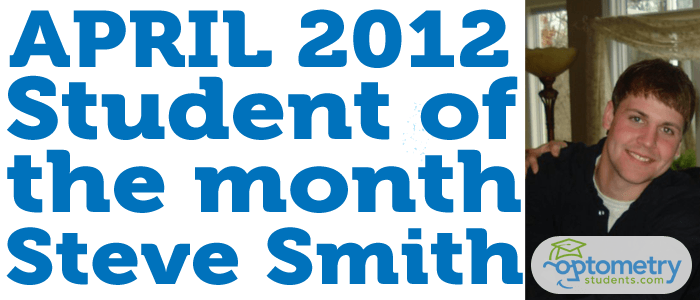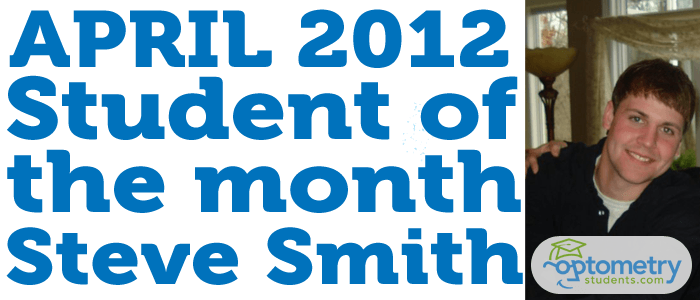This feature will highlight students on a monthly basis who go above and beyond for the profession of optometry. It’s time for those hard-working leaders to be recognized for their dedicated effort and achievements.We would like to introduce our April 2012 winner, Stephen Smith.
Name: Stephen Smith
School: Michigan College of Optometry
Year: Class of 2014
1. Congrats on winning Student of the Month! – Please tell us exactly why you won student of the month?
I believe I was selected based on my success and involvement in a multitude of areas for optometry. I have been able to maintain a quality GPA while being involved in many organizations and volunteering my time to represent optometry well and improve the scope of practice
2. Can you give a few words of advice to other students out there striving to achieve certain goals while in Optometry school?
Good time management has always served me well. I have always kept a detailed planner for each semester so I am aware of what is coming up, but I try not to look too far ahead and become overwhelmed by the work load. Also, staying involved in optometry events has really made me feel a part of optometry, and I have had great learning opportunities through them
3. Where are you from, where did you attend undergrad?
I am from Grand Rapids, MI and attended Michigan State University in East Lansing, MI
4. What did you study in undergrad, and what ultimately drove you to Optometry?
I majored in Human Biology at MSU. I became interested in optometry through my mom. She has always had vision problems and through attending some of her appointments, I became intrigued with the profession. Her optometrist offered shadowing times for me throughout high school and college which reaffirmed my interest in optometry.
5. What made you choose your school?
There were a lot of reasons why MCO was the right choice for me. I like being an hour from home, the small class size gives a lot more one-on-one time with the doctors, and the new optometry building offers state of the art procedure lanes, classrooms, and other technology.
6. Are you involved in any Optometry organizations, do you hold any special positions at school or have any other creative optometry ventures going on?
Member of AOSA (American Optometric Student Association)(2010-present), Member of the AOA (American Optometric Association) (2010-present), Member of the MOA (Michigan Optometric Association), Member of the MOSA (Michigan Optometric Student Association), Member of SVOSH (Student Volunteer Optometric Services to Humanity), Sports Vision Section (SVS) Member (2010-present), Member of MOSPPA (Michigan Optometric Student Private Practice Association), Member of Michigan College of Optometry’s Student Governement Committee, Member of CLCS (Contact lens and cornea section), Member of COVD (College of Optometrists in Vision Development), Member of AOA-PAC (political action committee)
7. What academic subject have you found most interesting in school thus far?
Contacts Lenses
8. What was the most difficult class for you thus far?
Geometric Optics
9. What was the most difficult clinical skill to learn?
The biomicroscope
10. If you’ve already started seeing patients in clinic, how did you help make the transition from student to intern? What techniques do you utilize to help develop a good rapport with the patients that you see?
Having done all the proficiencies to get to the clinic intern level, I feel confident in my base skill level to conduct a primary care exam. The hours of practice and lecture for the procedures really help provide a solid foundation of understanding of each exam element. A thorough case history allows me to get a good start to the exam and makes the patient know I want to resolve their chief complaint. Also, explaining the tests to the patient and educating them on findings allows them to feel a part of their health care.
11. Will you be doing a residency? Why or why not?
I have been considering doing a residency in contact lens or ocular disease. I feel it would make me a more valuable asset to a practice. I will put more thought into this upcoming year.
12. If you could change one thing about Optometry, what would it be?
I would want general eye exams to be covered as part of annual health care plans. This would increase patients coming in to be seen and prevent progressive vision problems for those without vision insurance.
13. How do you feel about the legislative battles surrounding Optometry?
I strongly support the work the AOA-PAC does concerning the legal issues of optometry and will continue to support them in mission for the advancement of optometry.
14. Where do you see yourself practicing after graduation? Where? What type of modality? Are you more interested in research, teaching, organized Optometry, or private practice?
I wouldn’t mind staying in the vicinity of my hometown, Grand Rapids, preferably near Lake Michigan. If no opportunities are available here, I have always like the Pacific Northwest region and would like to be live out there. I see myself working in a private practice upon graduation and later buying out the practice. It would be ideal for me to have one partner in the practice.
15. How will you make Optometry grow as a profession?
I am a current member of AOA-PAC and will continue to be active with this organization and the AOA in general.
16. What are some things you feel Optometry is lacking? Any ideas to combat this?
Being in Washington D.C. this past week, it has been eye opening to the issues optometry is currently dealing with. We lobbied for bill HR 1195 to allow optometry students to have the opportunity to apply for loan reimbursement upon graduation if working in an underserved area. We are one of the only health professions not included in this program. Also, we lobbied for bill HR 1219 to update the language between the Medicare and Medicaid programs so optometrists are regarded as physicians in both and can be reimbursed for their services. In both cases the passage of these bills would not only benefit optometrists, but those in need of eye care as well. The best way to make a difference here is continual advocacy of these issues to your representatives and senators.
17. Are you satisfied with your decision to pursue Optometry? Or can you see yourself doing something else?
I am completely satisfied with my decision to become an optometrist.
18. If you had a time machine, what would you change in history and why?
I would have gone back and prevented 9/11 from occurring. It was a great tragedy for the US. It really affected a lot of people/families and changed our society.
19. If you could go anywhere in the world for vacation, where would you go?
I have enjoyed traveling to the US national parks and have made it to over half of them so far. I would love to go to Alaska where there are 8 national parks.
20. If you were stranded on an island and could only bring 3 things, what would you bring?
A phoropter, polarized Maui Jim sunglasses to protect me from UV rays, and 20D lens to make fire from the sunlight.
21. What was your greatest achievement?
Once ate 24 chicken mcnuggets in one sitting.
22. What is your biggest strength / weakness?
Organization would be a strength for me and something I consider a weakness right now would be that I like to be in control of what I am doing and as a student that is not always the case pertaining to the exam lane, course schedule, etc.
23. What interests you most outside of Optometry?
Geography and traveling
24. You can cure one eye-disease, what would you cure?
Macular Degeneration
25. Would you rather be 5D Hyperopic or 6D Myopic? Why?
I would want to be a 6D Myopic, so when I get older I can just take my glasses off to read. A 5D hyperope would have to accommodate both at distance and near.
26. If you discovered/invented an ocular phenomenon or ophthalmic technique would you name it after yourself or would you name it after what it is/does? Why?
I would name it after what it does, so as not to torture future optometry students trying to remember what my technique or phenomenon was.



